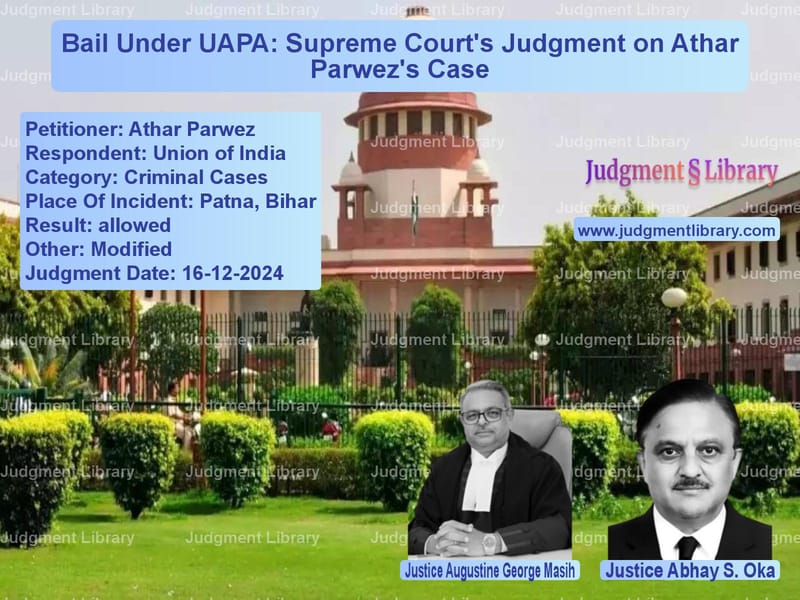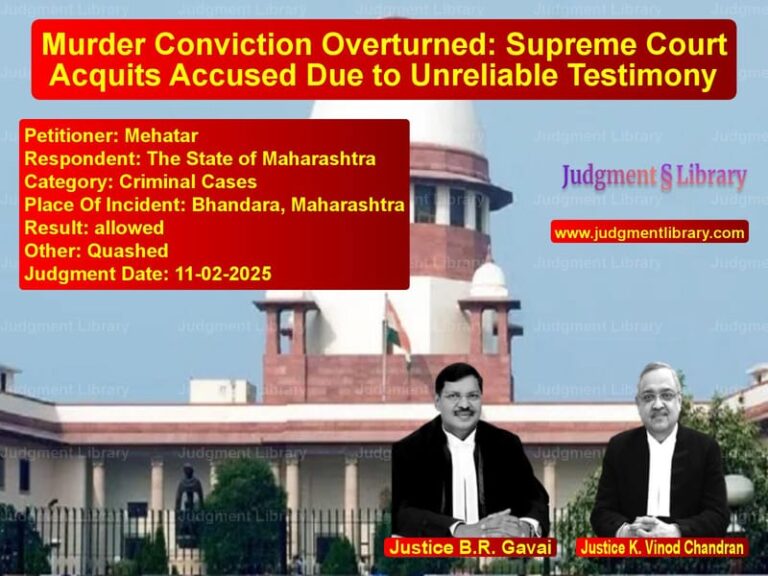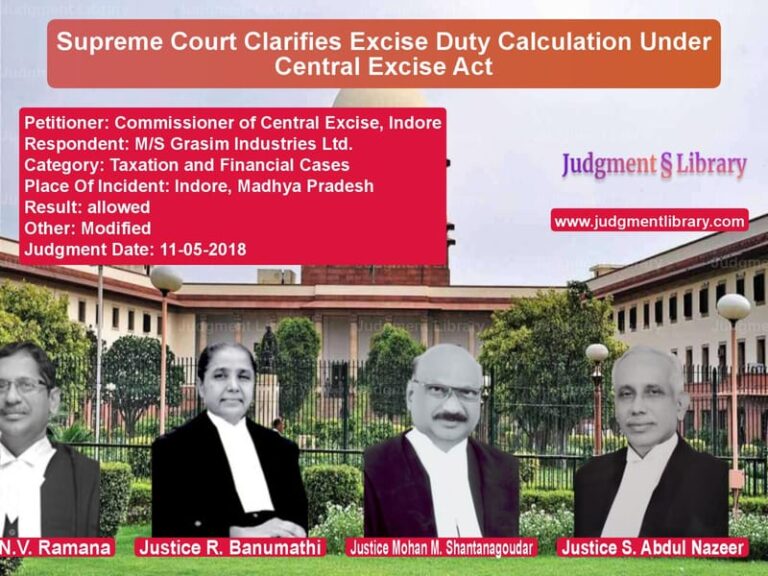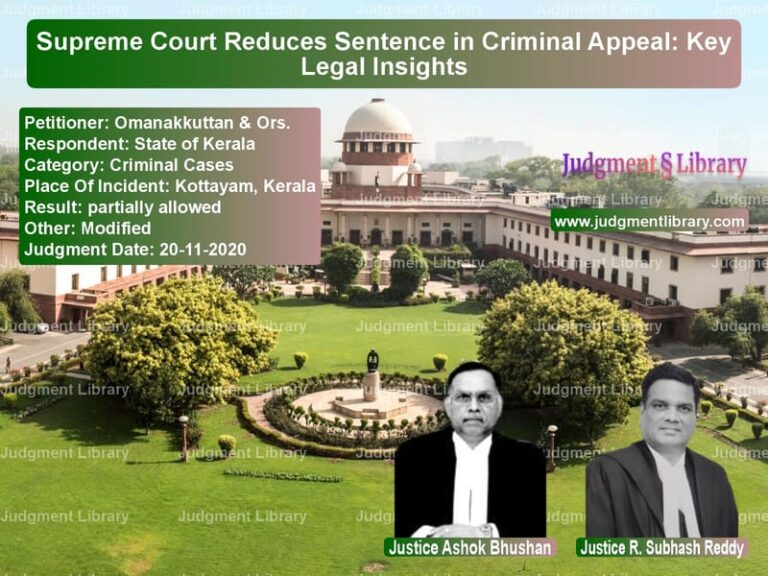Bail Under UAPA: Supreme Court’s Judgment on Athar Parwez’s Case
The case of Athar Parwez vs. Union of India is a crucial decision concerning the grant of bail under Section 43-D(5) of the Unlawful Activities (Prevention) Act, 1967 (UAPA). Athar Parwez, accused of involvement with the Popular Front of India (PFI), was arrested under multiple serious charges, including conspiracy, promoting enmity between different groups, and participating in unlawful activities against the sovereignty and integrity of India. His appeal for bail, rejected by the High Court, was subsequently taken up by the Supreme Court, which analyzed the legality of his prolonged detention and the charges against him.
Background of the Case
Athar Parwez, along with co-accused Jalaluddin Khan, was arrested on 12th July 2022 for his involvement with the Popular Front of India (PFI). The accusations against him included planning to disrupt the visit of the Prime Minister to Patna, and involvement in organizing meetings that allegedly aimed at establishing an Islamic rule in India. Key documents recovered during raids suggested links to radical ideologies, including a document titled “India 2047 towards rule of Islam in India, internal Document not for circulation”. These revelations were presented as evidence that the accused had conspired to carry out unlawful activities and were active in promoting violence and division in society.
The trial against Parwez and his co-accused had been progressing slowly, with the charges yet to be framed, despite the filing of the chargesheet in January 2023. The appellant sought bail during the pendency of the trial, claiming that he had already been incarcerated for over two years without any likelihood of a speedy trial.
Arguments of the Petitioner
The petitioner, through his counsel, argued that:
- The prosecution’s evidence was insufficient to substantiate the severe allegations against him. The primary evidence included a document that did not directly incite violence or unlawful activities.
- The documents seized during the raid, especially the contentious “India 2047” document, were found to be fabricated or misconstrued, and no terrorist activities were explicitly planned as per the contents.
- The appellant was arrested over two years ago, and no substantial progress had been made in the trial. This delay violated his constitutional right to a speedy trial under Article 21 of the Constitution of India.
- Similar co-accused, like Jalaluddin Khan, had been granted bail, and the appellant should be given the same treatment as his co-accused, given the lack of conclusive evidence against him.
Arguments of the Respondent
The respondent, represented by the learned Additional Solicitor General, countered the petitioner’s arguments by emphasizing:
- The severity of the charges under UAPA, 1967, and the extensive evidence of the appellant’s involvement in organizing protests, which included derogatory slogans and divisive rhetoric. The meetings, which were organized on 6th and 7th July 2022, allegedly promoted violent actions against individuals who criticized Islam and the Prophet Muhammad.
- The documents and other recoveries, such as electronic devices, provided evidence of the appellant’s active participation in unlawful activities. The recovered items were directly linked to the promotion of terror and the destabilization of India’s sovereignty.
- The appellant had participated in several PFI activities, which aimed at creating a divide in the country. The role of the appellant in these activities was further corroborated by testimony from protected witnesses.
Supreme Court’s Analysis
The Supreme Court considered the arguments of both parties and critically evaluated the evidence presented. The Court highlighted key points:
- While the appellant was an active member of PFI, the evidence provided was not sufficient to conclusively prove that the appellant was directly involved in any terrorist activity. The recovery of documents, while suspicious, did not explicitly establish a conspiracy for violent acts.
- The length of time the appellant had been incarcerated without trial was a key concern. The Court noted the appellant’s constitutional right to a speedy trial, and the prolonged delay in his case violated his rights under Article 21 of the Constitution.
- The fact that charges had not been framed despite the chargesheet being filed was an additional factor in favor of the appellant’s plea for bail.
Final Judgment
The Supreme Court allowed the appeal and granted bail to Athar Parwez. The Court stated:
- The appellant’s prolonged detention violated his right to a speedy trial as guaranteed by the Constitution.
- The Court acknowledged the serious nature of the charges but also noted that the evidence was not strong enough to warrant continued detention, especially considering the time already spent in jail without trial.
- The appellant was granted bail on the condition that he would be produced before the Special Court within seven days, and that the terms and conditions of the bail would be decided by the Special Court after hearing the prosecution’s views.
As a result, the Court set aside the order of the High Court and granted bail to the appellant, underlining the importance of balancing the seriousness of the accusations with the constitutional rights of the accused.
Petitioner Name: Athar Parwez.Respondent Name: Union of India.Judgment By: Justice Augustine George Masih, Justice Abhay S. Oka.Place Of Incident: Patna, Bihar.Judgment Date: 16-12-2024.
Don’t miss out on the full details! Download the complete judgment in PDF format below and gain valuable insights instantly!
Download Judgment: athar-parwez-vs-union-of-india-supreme-court-of-india-judgment-dated-16-12-2024.pdf
Directly Download Judgment: Directly download this Judgment
See all petitions in Bail and Anticipatory Bail
See all petitions in Terrorist Activities
See all petitions in SC/ST Act Case
See all petitions in Judgment by Augustine George Masih
See all petitions in Judgment by Abhay S. Oka
See all petitions in allowed
See all petitions in Modified
See all petitions in supreme court of India judgments December 2024
See all petitions in 2024 judgments
See all posts in Criminal Cases Category
See all allowed petitions in Criminal Cases Category
See all Dismissed petitions in Criminal Cases Category
See all partially allowed petitions in Criminal Cases Category







